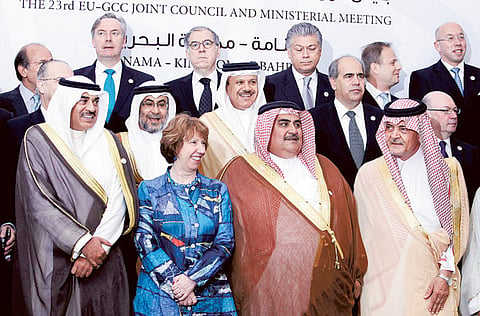GCC looks for better relations with Iran
Gulf states’ support in Syria is ‘selective and meant to reach a comprehensive political solution’

Manama: The GCC is looking for improved relations with Iran and to positive steps by the newly elected president Hassan Rouhani towards the region, Bahrain’s foreign minister said.
“The GCC countries have welcomed the election of President Rouhani and the statements about the situation in the region,” Shaikh Khalid Bin Ahmad Al Khalifa said.
The minister was speaking in Manama at a joint press conference with EU foreign policy chief Catherine Ashton following a GCC-EU meeting.
“However, the situation remains explosive in light of the blatant interference in Syria,” Shaikh Khalid said, referring mainly to Hezbollah, the Lebanese militia. “We also have a history of Iranian interference cases in the region, but we do look forward to starting a new chapter. We hope Iran will have a role in pulling out all foreign forces currently in Syria.”
Relations between Tehran and most of the GCC capitals have been particularly tense over the last two years amid accusations by Gulf countries, mainly Bahrain and Saudi Arabia, against Iran of meddling in their domestic affairs. Iran has invariably denied the charges.
The busting of espionage networks in Bahrain and Saudi Arabia reportedly working for the Iranian intelligence services has compounded the situation.
Mistrust grew over the opposite stances that the two shores of the Arabian Gulf adopted towards the situation in Syria.
Shaikh Khalid that the GCC support in Syria was selective and meant to reach a comprehensive political solution that will lead to stability in the country.
The foreign minister said that the GCC stressed “the significance of assisting the Syrian people defend itself from fierce internal and external onslaughts.”
He added that the GCC looked at the Arab peace initiative as the way forward to have peace between the Palestinians and the Israelis, and all Arab countries with Israel.
The initiative will lead to establishing normal relations, like the ones between the different countries throughout the world, he said.
He added that the ongoing efforts by US Secretary of State John Kerry to re-launch peace talks between the Palestinians and the Israelis should be supported.
Shaikh Khalid said that the GCC, made up of Bahrain, Kuwait, Oman, Qatar, Saudi Arabia and the United Arab Emirates, looked forward to a stable Iraq.
He added that Lebanon was much bigger than Hezbollah and that it could not be allowed to become a hostage held by the “terrorist party”.
“We would like to continue working with Lebanon, its president and government and that the country will shake off its current situation,” he said.
The minister added that the GCC interior ministers were working on putting Hezbollah on the list of terrorist organisations.
Bahrain’s parliament has been pushing for the terror tag, a move endorsed by the government.



